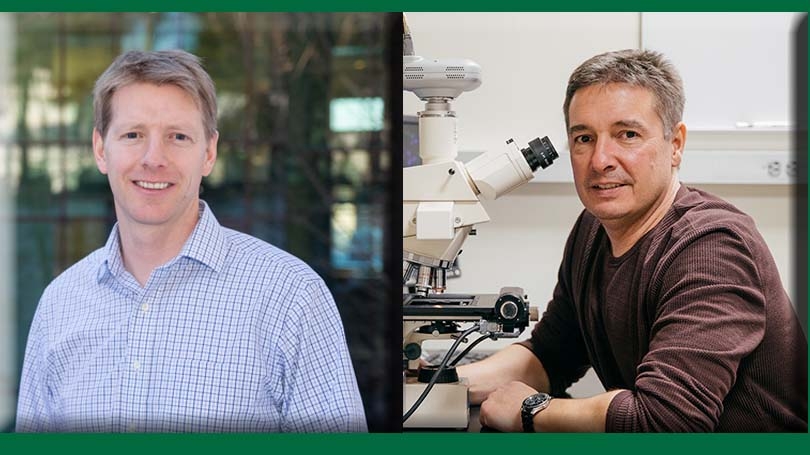The Graduate Student Council presents the Faculty Mentoring Award in recognition of outstanding commitment to fostering the professional and personal development of graduate students. Nomination letters from the graduate student community highlight the multi-faceted characteristics of effective mentorship.
Significant value is placed on these nurturing relationships that are supportive, confidential, both professionally and personally, and crucially, lie outside the parameters of assessment and evaluation. It is an essential tool for navigating the challenges of balancing research, teaching, and publishing and a positive mentoring relationship can impact the decision to stay in academia. It is associated with higher career satisfaction and research success, socializes mentees to the academic profession, and strengthens departments by preparing junior researchers for the rigors of academia.
The substantial responsibilities and stresses of graduate students are often driven by factors out with their control, resulting in a certain vulnerability to the power dynamics and structures of their programs. This year’s award recipients understand this implicitly and were recognized by their nominators for demonstrating high levels of academic leadership and emotional intelligence. We are delighted to announce that the winners of the 2018 Faculty Mentoring Award are Dave Bucci, Ralph and Richard Lazarus Professor and Chair of the Department of Psychological and Brain Sciences, and Erich Osterberg, Assistant Professor in the Department of Earth Sciences.
Dave Bucci was commended by his nominators for his availability, supportiveness, and skilled approach to leading his students. “Instead of telling me exactly what to do,” read one nomination, “he offers positive and constructive feedback allowing me to independently better my experimental design.” As a mentor and leader Dave is intentional and systematic, “graduate students are here to learn, this is graduate school,” he emphasizes, “we have to actively advise and be involved in their education.” He scaffolds learning experiences that offer high odds for success, but he also recognizes the value of failure and allows his students to wrestle with this in a supportive environment.
His responsiveness is not the result of extensive research, but stems from an innate ability to empathize and to take seriously the responsibility of academic leadership. He credits one of his own mentors, former Chair of the Psychological and Brain Sciences Department, Jay Hull, with honing his own approach to offering an open-door and unbiased policy to mentoring and leading. “It’s incumbent upon us to be cognizant that students bring different skills and backgrounds to the table, and each will develop at his/her own pace. We also need to recognize power dynamics,” he says, “to be aware of those in less powerful positions, and to provide everyone with the resources they need, especially those who really need them and those who don’t know how to access them.”
Effective mentoring requires a long-term strategy and the continued engagement of students in the field lies in the capability of the mentee to continue the legacy as they eventually rise to be seen as a colleague in the eyes of their mentor. “As my career progresses, and I become a leader, mentor, and advisor, I will strive to model what I’ve learned from Dave,” wrote one student in support of his nomination. Professor Bucci genuinely understands the importance of effective leadership and sincerely invests in his students, and all those in the program. He is indeed a most deserving recipient of the Faculty Mentoring Award. Congratulations!
Erich Osterberg knows the key to effective mentoring lies in long-term strategies. Asking prospective graduate students to define their career goals in their application interview might put some off balance, but “beginning with the end in mind” as Erich puts it, and guiding them towards achieving those goals drives his mentoring approach. And this drive and passion are contagious; “nearly every student has superb reviews for Erich’s classes,” writes one nominator, “and many have become so interested in glaciology that they’ve worked for several terms in his ice core laboratory.”
Although Erich would say it is very much a team effort in the department of Earth Sciences, where students researching climate and glaciers often have the benefit of two mentors, Erich’s enthusiasm for his field and, consequentially for imbuing his students with that same enthusiasm, is a key marker of his success as a mentor. Indeed, when the challenge is not simply producing data, but dragging scientific equipment up a 13,000 feet mountain through a winter storm to gather it, and keeping students motivated, it makes even the coldest walk to the lab in winter seem like a walk in the park.
This dedication is clearly evident in his mentoring method. Erich sets high standards for his students and empowers them to take on new challenges. He has an open-door policy and respects his students’ efforts. “He often responds to my emails with edits to a manuscript long after I have gone to bed,” writes one mentee, “and beats me into the office in the morning.” All this is driven by the knowledge of what makes his students tick, and his responsiveness helps students develop the most competitive CVs they can during their time with him.
Erich clearly understands just how incredibly tough the academic job market is for his students, and throughout their time at Dartmouth he offers opportunities to challenge their research, to develop leadership capabilities, experience high level academic environments, and opportunities to transfer their skills so they feel empowered to pursue the career that will drive their own passions.
The relationship between Erich and his students is built on respect, and guided by the approach of his own mentors. His high expectations are matched with impressive availability, despite numerous other obligations, and his students go on to feel fulfilled and excited about the work they are doing, long after they leave Dartmouth. In recognition of this excellent work, we ask you to join us in congratulating Professor Osterberg as recipient of the 2018 Faculty Mentoring Award.
